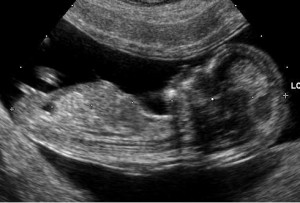the rise of ‘prenatal feminism’
There is a ‘war on unborn women’, declares Kurt Kondrich, an American father and anti-abortion campaigner. ‘Rapid advances in prenatal testing,’ he declares, ‘Will soon allow this broken culture to wage war on any person deemed ‘flawed’ or ‘substandard’.’
Kondrich is referring to prenatal testing that identifies sex, as well as disabilities such as Down Syndrome (with 99.9% accuracy) as early as nine weeks. Buried amongst the angry rhetoric and guilt-inducing bias typical of the pro-life movement, the argument is nestled securely in the Religious Right. The christian conservatism in the US is famous for condemning abortion as ‘evil’ and ‘murderous’, and in many respects, argues against progress for reproductive rights.
Despite his biased view, the father poses an important question: is it okay to abort a potential child if it has features we don’t desire? An article at The Atlantic claims that 70-85% of parents whose foetus tests positive to Down Syndrome schedule a termination. What ethics surround our desire to control the characteristics of a future child?
Kondrich calls himself a ‘prenatal feminist’. While he mainly voices a concern about the lives of babies who test positive for Down Syndrome, sex-selective abortion is an alarming problem.
You may have heard a friend or family member say something like, ‘After two boys, I’ll tear my hair out if this next one isn’t a girl!’ Could you imagine her popping in to the local abortion clinic because the foetus in her belly was not what she and her partner desired?
There’s not much information on sex-selective abortion in Australia. In countries like China and India, however, it’s an accepted fact. The number of ‘missing women’ (babies aborted in preference of male child) is stunning: the UN estimates up to 200 million . Called ‘infanticide’ or ‘gendercide’, the deaths are caused by abortion or neglect following the birth.
In India, sex determination for the purpose of selective abortion has been illegal since 1996. Newspaper The Hindu estimates that half a million female foetuses are aborted every year due to a ‘son preference’.
The New York Times breaks down the reasons why boys are preferred: ‘In Hindu funeral rituals, only males, preferably a son of the deceased, may perform last rites; sons also usually inherit property (while daughters are married into other families) and carry on the family name.’ Primarily, this is a trend for wealthy and educated families, especially if the first born is female.
In China, 117.8 boys are born to every 100 girls—China’s National Bureau of Statistics predict in 2020 that men ‘of marriageable age’ will outnumber women by 24 million. That is more than Australia’s population! One of the solutions being discussed is a financial bonus for parents who give birth to a girl.
The one-child policy is an obvious factor in China’s imbalance, as well as a patriarchal society that labels men a financial gain and women a liability . A Feminspire article on sex-selective abortion explains: ‘In cultures where the marriage of a daughter requires the payment of a dowry, where sons but not daughters are expected to look after their parents in old age, or where a married daughter cannot contribute to her parents’ finances, having a son instead could be a major economic advantage.’
And closer to home? While there are no solid facts, one hears about individual circumstances. Earlier this year, journalist Natasha Bita discovered that this practice allegedly happens in Australia, too. Some couples have requested abortions on the basis of their child’s sex, including a Melbourne husband and wife who were quite upfront with their GP.
Lipster Amy Nicholls-Diver reported on this in April: ‘President of the National Association of Specialist Obstetricians and Gynaecologists, Andrew Foote, suggested that results of chromosomal tests that reveal an embryo’s sex be kept secret until 20 weeks into the pregnancy.’
An Adelaide couple aborted twin boys in 2011, desperate for a daughter after having three sons. They appealed to the Patient Review Panel to choose the sex of their next child using IVF (technically banned), but their request was rejected.
Speaking to Adelaide Now, the father said, ‘Girls will go and get abortions and terminate when they know it’s not the right sex. That’s the reality…We think it’s our right to have a chance to do it.’
In June, Victorian Democratic Labor Party Senator John Madigan introduced a bill designed to remove Medicare funding to sex-selective abortion. While this rule is easily avoided, it effectively condemns the practice.
Unfortunately, Madigan sounds too much like an over-zealous anti-abortion campaigner bereft of gritty truths or political reality, and some commentators believe this is the pro-lifer’s first step towards restricting access to abortion.
It’s hard to imagine what cultural mores in Australia would cause sex-selective abortion. A Senate Inquiry propelled by the Democratic Labor Party proposal is investigating ‘the prevalence of gender-selection—with preference to a male child—amongst some ethnic groups.’
But who are the people asking for discriminatory abortions?
They are people heralding from patriarchal, developing countries. They are grief-stricken parents who are desperate for a daughter. They are people who want control over characteristics of their children.
Contrary to developing countries, in Australia there is no ‘war on unborn women’. There are, however, rare accounts of parents intent on deciding the sex of their baby. Our society accepts the termination of a foetus with disabilities—how far can this decision go? What is the extent of our reproductive rights?


